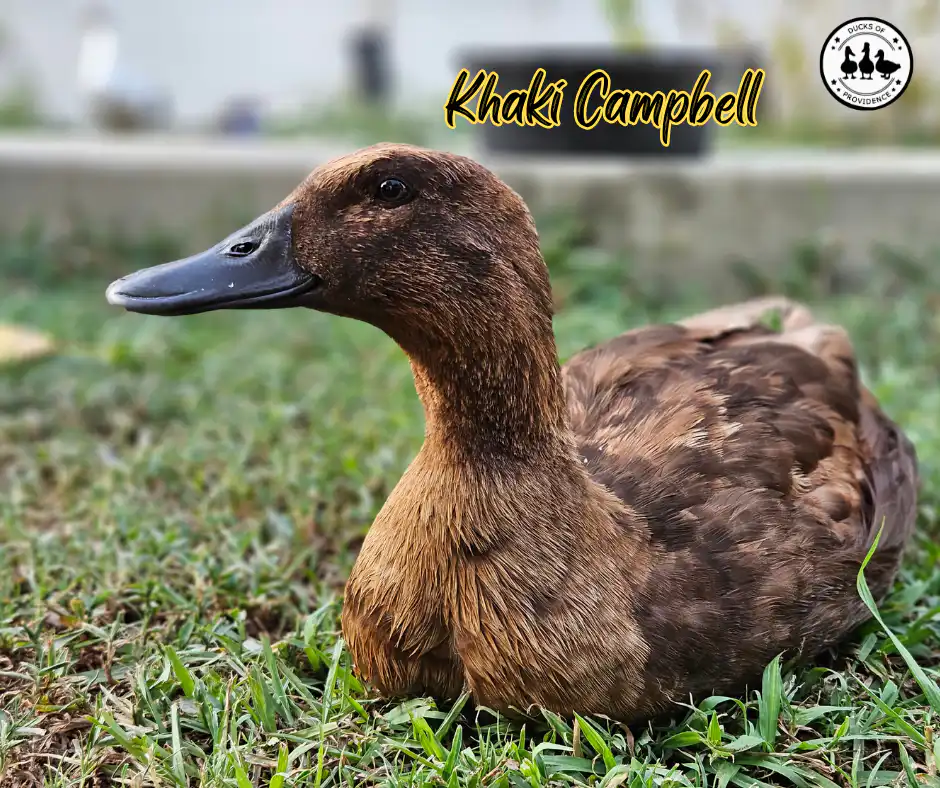
Khaki Campbell: The Champion Egg Layer That Can (Almost) Fly
Last updated: January 15th, 2026
We have one Khaki Campbell duck ourselves, and her name is Krümel. She is the friendliest of all our ducks and enjoys interacting with us. If I could recommend one duck as a pet, Khakis would be my absolute favorite. But let’s learn a bit more about this duck breed.
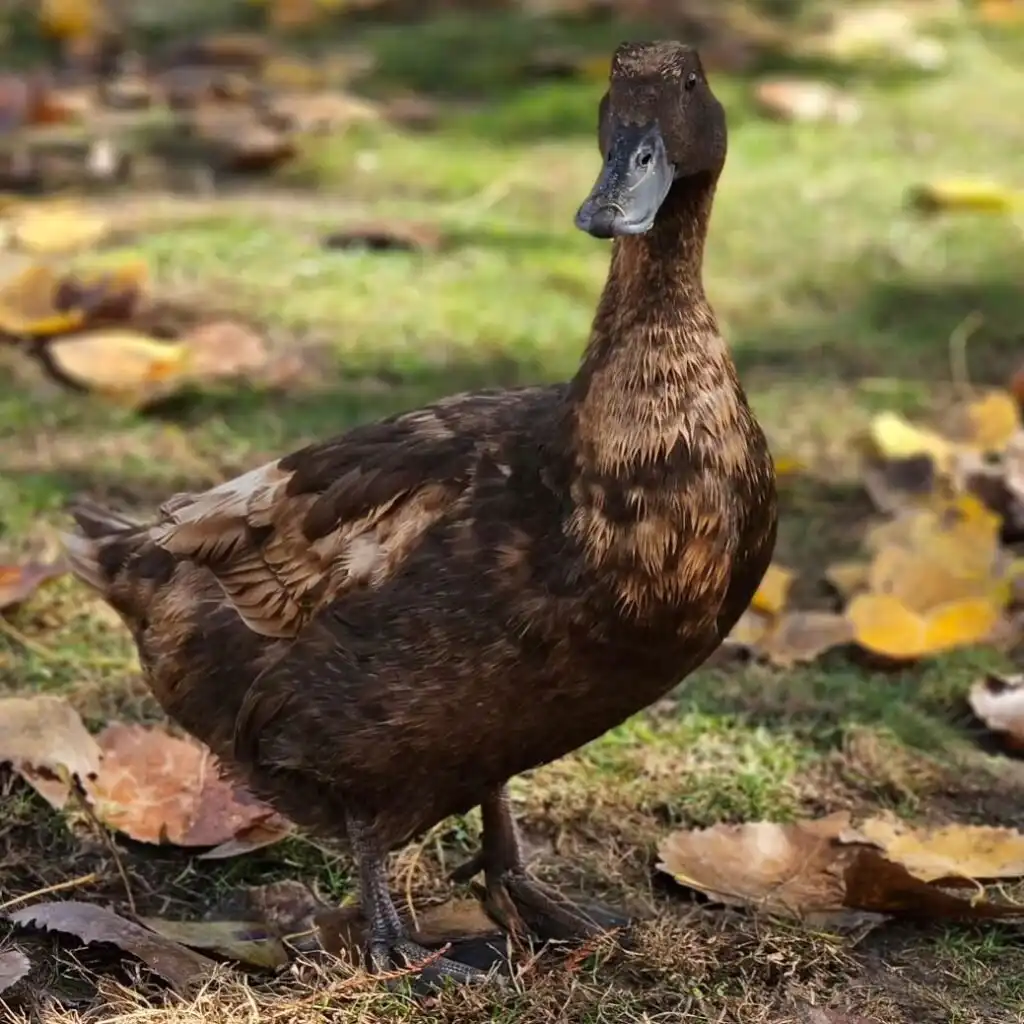
Here’s a table highlighting the breed characteristics of Khaki Campbell ducks:
| Characteristic | Details |
|---|---|
| Color | Khaki Campbell ducks have a khaki-brown plumage, with drakes often showing darker brown heads and necks. |
| Weight (Male) | Approximately 4.5-5.5 lbs (2.0-2.5 kg) |
| Weight (Female) | Approximately 4-4.5 lbs (1.8-2.0 kg) |
| Egg Color | White to light green |
| Egg Production | 250-340 eggs per year, making them one of the top egg-laying duck breeds. |
| Body Shape | Slim and streamlined, with a slightly upright stance and a long neck. |
| Temperament | Active, hardy, and generally friendly, though they can be a bit shy. |
| Broodiness | Rarely broody; Khaki Campbells are bred more for egg production than for raising ducklings. |
| Flying Ability | They require plenty of space to forage and stay active; they thrive with access to water for swimming. |
| Special Care | Rarely broody, Khaki Campbells are bred more for egg production than for raising ducklings. |
| Origin | Developed in England in the early 20th century by crossbreeding Mallard, Rouen, and Runner ducks. |
Ducks of Providence is free, thanks to reader support! Ads and affiliate links help us cover costs—if you shop through our links, we may earn a small commission at no extra cost to you. Thanks for helping keep our content free and our ducks happy! 🦆 Learn more
History of Khaki Campbell Ducks
Our story begins in the late 1800s in England, where a visionary duck breeder named Mrs. Adele Campbell of Gloucestershire set out to create a duck breed with exceptional egg-laying abilities. Through careful crossbreeding involving Rouen, Runner, and Mallard ducks, Mrs. Campbell achieved her goal and introduced the world to the Khaki Campbell in 1898.
Named after their dedicated breeder and their distinctive khaki-colored plumage, Khaki Campbells quickly gained popularity for their prolific egg-laying ability and friendly demeanor. Since then, they’ve become a beloved favorite among duck enthusiasts worldwide.
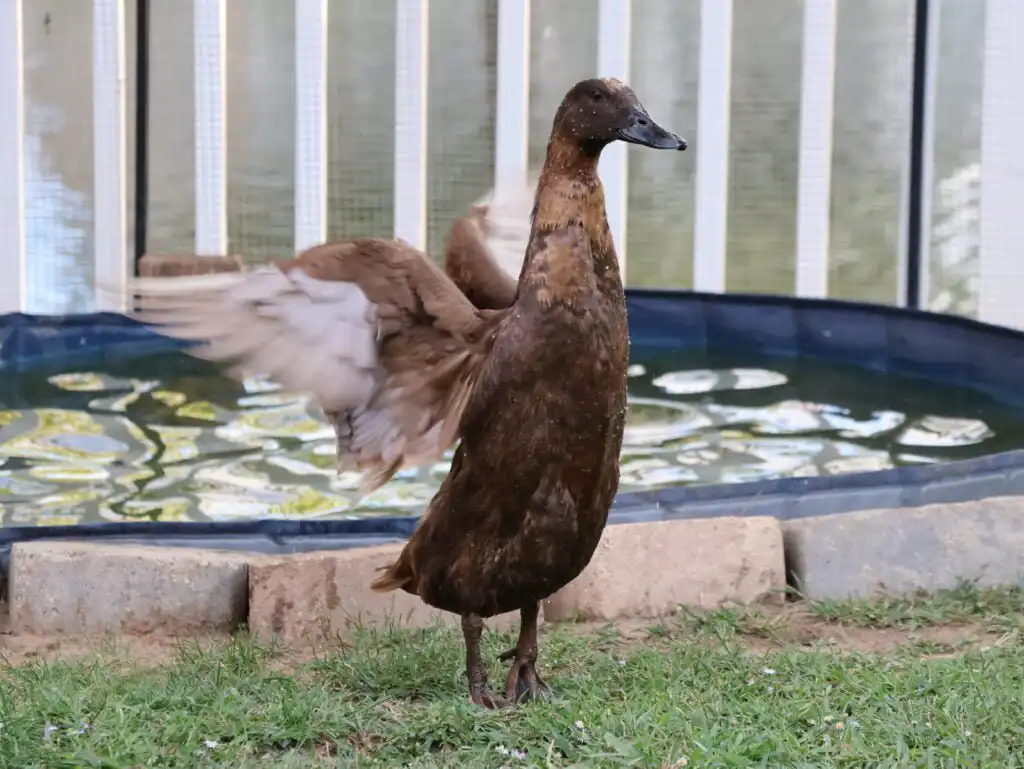
In 1929, Campbells were introduced to the United States by Perry Fish of Syracuse, New York. Although acknowledged by the American Poultry Association (APA) in its American Standard of Perfection by 1941, their population remained low for several years. However, their fortunes shifted in the 1970s when the number of Khaki Campbells surged in the US. This increase was attributed to the rise of the back-to-the-land movement, an influx of Asian immigrants who favored duck eggs after the Vietnam War, and the introduction of a highly productive strain of Khaki Campbells in 1977.
Characteristics of Khaki Campbell Ducks
Now, let’s take a closer look at what makes Khaki Campbells so special:
Size and Build of Khaki Campbell Ducks
Khaki Campbells are considered a smaller, lightweight duck breed, making them easy to manage for backyard keepers and homesteaders alike. Their streamlined bodies and upright posture give them a graceful look, but don’t let their size fool you—they’re full of energy and personality.
Males typically weigh between 4 to 4.5 pounds (1.8–2 kilograms), while females tend to be slightly lighter, usually around 3.5 to 4 pounds (1.6–1.8 kilograms). Their compact build contributes to their excellent foraging ability and helps them conserve energy, especially during active laying seasons.
Lifespan and Longevity
With proper care, a nutritious diet, and a safe environment, Khaki Campbells can live anywhere from 7 to 10 years. This is on the longer side for domestic ducks, which makes them a wonderful long-term companion for duck keepers. While they’re hardy birds, regular health checks and protection from predators go a long way in helping them thrive well into their golden years.
Egg-Laying Powerhouses
One of the biggest reasons Khaki Campbells are so popular is their exceptional egg-laying ability. Under optimal conditions, a single hen can lay up to 340 eggs per year—that’s nearly an egg a day! These eggs are medium to large in size and usually range in color from white to a light cream tint.
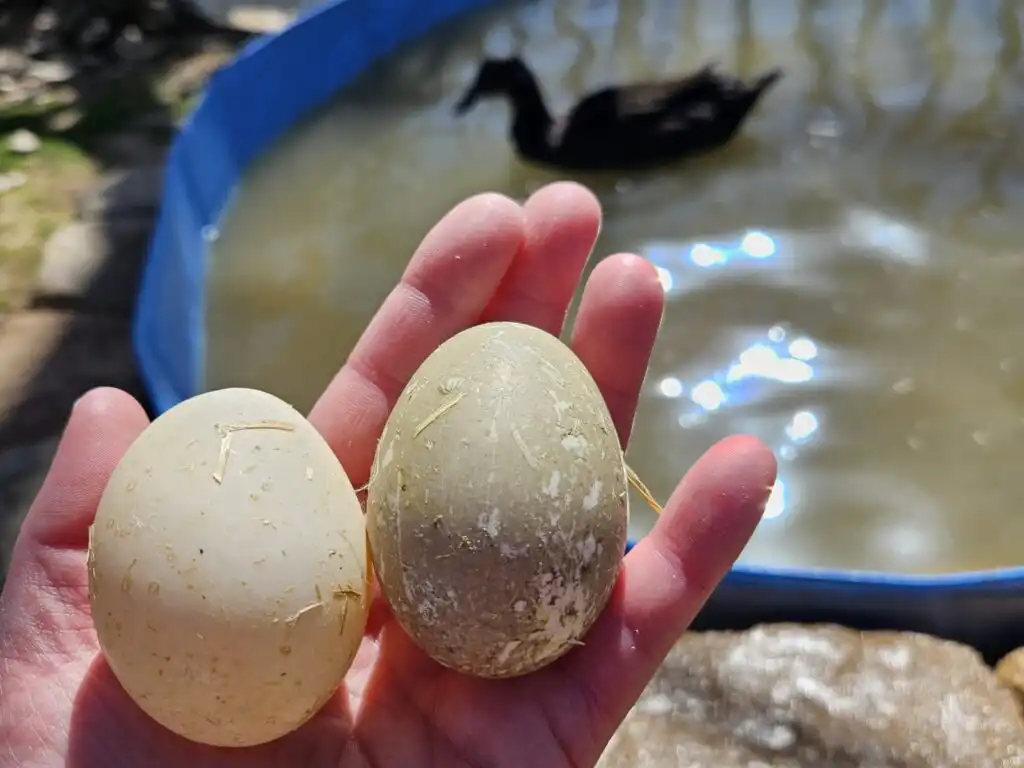
This makes them an ideal choice for families who love fresh eggs or small-scale farmers looking to sell duck eggs at local markets.
Adaptability to Environments
Whether you live in a cozy urban backyard or on a spacious rural farm, Khaki Campbells are likely to feel right at home. Their adaptable nature means they can thrive in various climates and conditions. All they ask for is access to fresh water for swimming, space to explore, and a clean, dry shelter to rest in.
Their ability to adjust also makes them a good starter breed for new duck keepers looking for low-maintenance birds.
Low Broodiness
Unlike heritage breeds that go broody and want to hatch their own eggs, Khaki Campbell hens usually don’t show strong broody tendencies. This trait supports their reputation as high-output layers, since they rarely take a break from laying to sit on a nest. If you’re more interested in egg production than raising ducklings, this quality is a big plus.
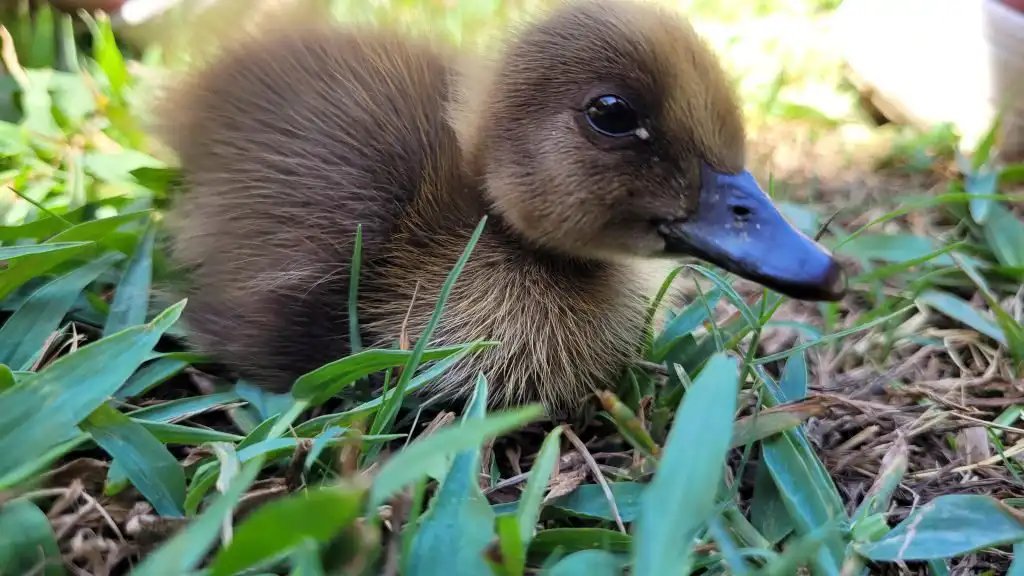
Dietary Needs
Khaki Campbells do best on a balanced diet made up of nutritionally complete duck pellets, which support their high energy needs. Supplementing with fresh greens, chopped vegetables, and protein-rich treats like mealworms or grubs keeps their diet varied and nutritious.
Like all ducks, they need constant access to clean water—not just for drinking, but for dunking their food, cleaning their bills, and staying in tip-top shape.
Friendly and Curious Temperament
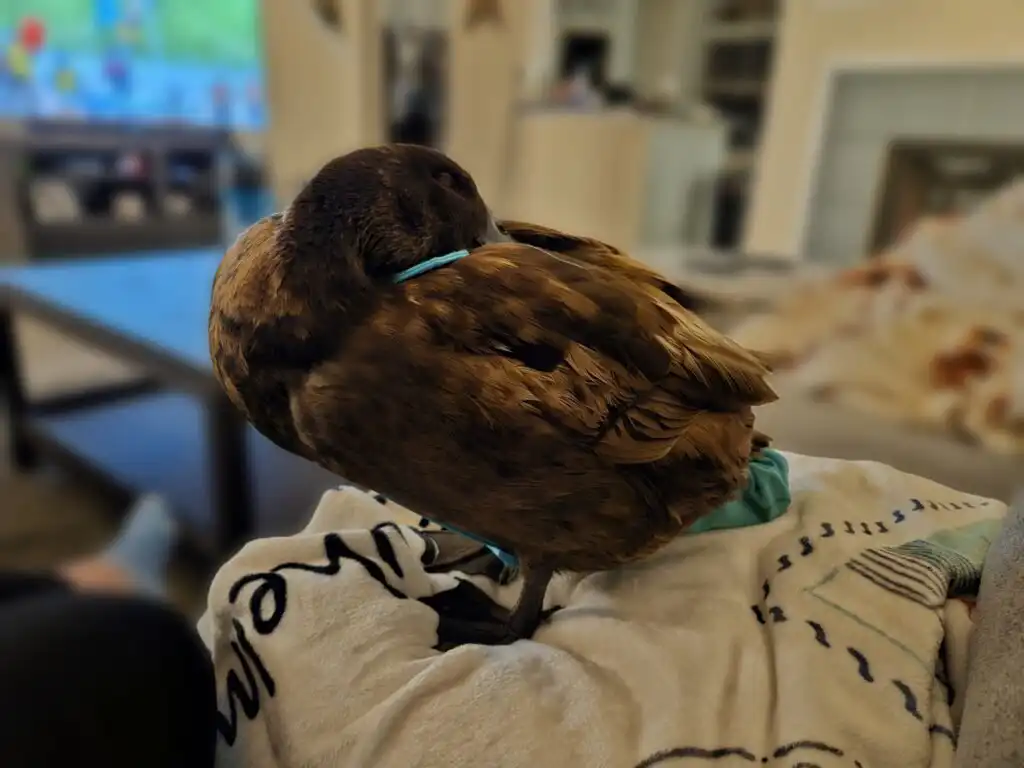
Khaki Campbells are known for their sweet and social personalities. They often develop strong bonds with their keepers and enjoy interacting with both people and other ducks. While they may be a bit shy at first, with regular, gentle handling, they become confident and even playful members of the flock.
Their calm disposition makes them an excellent choice for families or anyone wanting a gentle-natured duck.
Distinctive Plumage
Their feather coloration gives Khaki Campbells their name—and their unique look. Though both sexes share the same general khaki coloring, there are subtle differences:
Drakes (males) typically have darker heads, often with a greenish or bronze sheen. Their bills are green, and their feet are a rich dark orange. Some may even show hints of bronze on their back and tail.
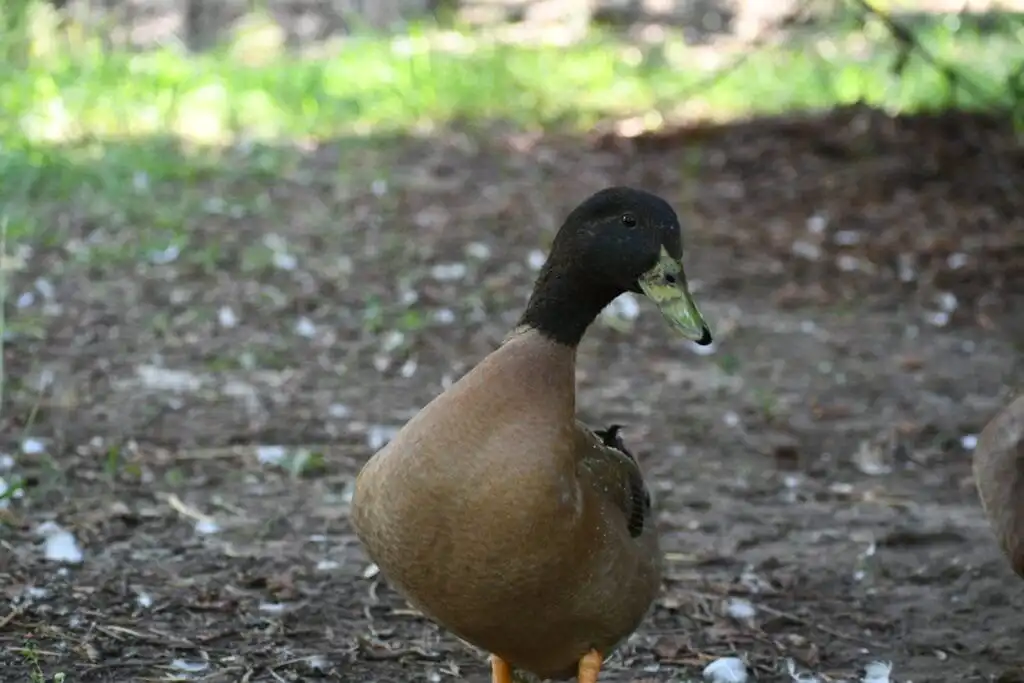
Hens (females) are usually a uniform shade of khaki throughout, with lighter brown heads and bills that lean more toward golden yellow. Their legs and feet tend to be a soft dusty brown.
Ducklings, regardless of sex, are dark brown to black with splashes of white on their chest, giving them a sweet, fuzzy tuxedo look.
Environmental Impact
Khaki Campbells aren’t just cute—they’re helpful too! These ducks are excellent foragers and will gladly snack on garden pests like snails, slugs, and insects. Their love for poking around in the grass makes them great natural pest control.
Plus, their nutrient-rich manure can be composted and used to fertilize your garden beds, closing the loop between duck care and sustainable living.
Heritage Significance
As a recognized heritage breed, Khaki Campbells play an important role in preserving biodiversity and agricultural history. Organizations like the Livestock Conservancy highlight the importance of maintaining these traditional breeds, both for their genetics and their legacy. By keeping Khaki Campbells, you’re not just raising ducks—you’re participating in a larger movement to protect rare and valuable traits in domestic animals.
The Almost-Flying Duck
While you won’t see a Khaki Campbell take off and soar like a Mallard, these ducks are surprisingly agile. They’re capable of short, low flights—especially when startled or trying to get to a favorite perch. In most cases, they don’t require wing clipping, as their flying attempts are brief and low to the ground.
On the Quieter Side
For duck keepers concerned about noise—especially in urban areas—Khaki Campbells tend to be quieter than some of the louder breeds. Hens will still chatter and quack, especially when they’re excited or laying, but overall, this breed is considered relatively low on the volume scale. A great choice if you’re trying to stay on the good side of your neighbors!
With their friendly personalities, impressive egg production, and easy-care nature, Khaki Campbell ducks are a fantastic choice for backyard duck enthusiasts. So, why not give these charming feathered friends a try? You might just find yourself with a coop full of sunshine and a fridge full of delicious eggs! Khaki Campbells are sure to steal your heart.
Do you have any experiences with Khaki Campbells or fascinating facts to share? Drop them in the comments below, and let’s keep the duck conversation quacking! 🦆💬
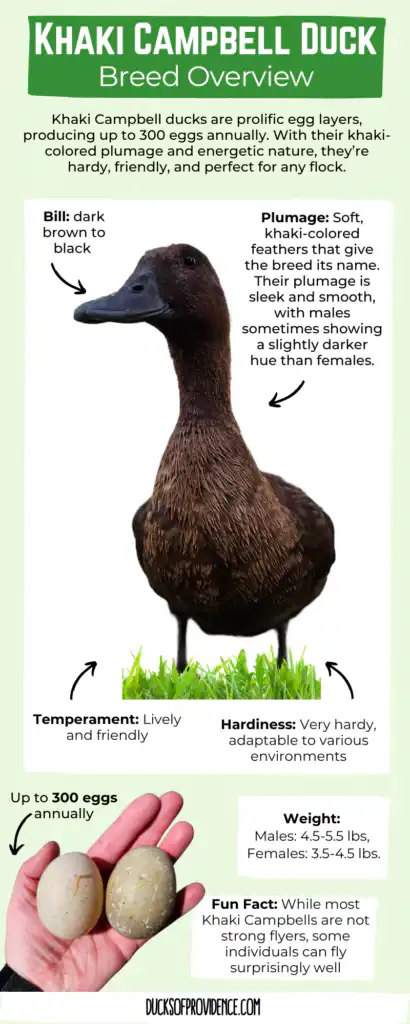

Where can i buy fertile eggs for Khaki Cambell duck bread?
As far as I know, you can buy them at Meyer Hatchery https://meyerhatchery.com/products/duck-hatching-eggs. You might also find some on marketplaces like eBay.